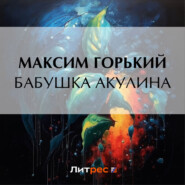По всем вопросам обращайтесь на: info@litportal.ru
(©) 2003-2024.
✖
Through Russia
Настройки чтения
Размер шрифта
Высота строк
Поля
He grabbed the book by its cover, and, by dint of holding the candle close to its pages, discovered, eventually, that matters were as I had stated.
This took him aback completely.
"What can the fact mean?" he exclaimed. "Oh, I know what has happened. The mistake has come of my being in such a hurry. The other book, the true Psalter, is a fat, heavy volume, whereas this one is – "
For a moment he seemed sobered by the shock. At all events, he rose and, approaching the corpse, said, as he bent over the bed with his beard held back:
"Pardon me, Vasil, but what is to be done?"
Then he straightened himself again, threw back his curls, and, drawing a bottle from his pocket, and thrusting the neck of the bottle into his mouth, took a long draught, with a whistling of his nostrils as he did so.
"Well?" I said.
"Well, I intend to go to bed – my idea is to drink and enjoy myself awhile."
"Go, then."
"And what of the reading?"
"Who would wish you to mumble words which you would not be comprehending as you uttered them?"
The deacon reseated himself upon the bench, leaned forward, buried his face in his hands and remained silent.
Fast the July night was waning. Fast its shadows were dissolving into corners, and allowing a whiff of fresh dewy morningtide to enter at the window. Already was the combined light of the two candles growing paler, with their flames looking like the eyes of a frightened child.
"You have lived your life, Vasi," at length the deacon muttered, "and though once I had a place to which to resort, now I shall have none. Yes, my last friend is dead. Oh Lord – where is Thy justice?"
For myself, I went and took a seat by the window, and, thrusting my head into the open air, lit a pipe, and continued to listen with a shiver to the deacon's wailings.
"Folk used to gird at my wife," he went on, "and now they are gnawing at me as pigs might gnaw at a cabbage. That is so, Vasil. Yes that is so."
Again the bottle made its appearance. Again the deacon took a draught. Again he wiped his beard. Then he bent over the dead man once more, and kissed the corpse's forehead.
"Good-bye, friend of mine!" he said. Then to myself he added with unlooked-for clarity and vigour:
"My friend here was but a plain man – a man as inconspicuous among his fellows as a rook among a flock of rooks. Yet no rook was he. Rather, he was a snow-white dove, though none but I realised the fact. And now he has been withdrawn from the 'grievous bondage of Pharaoh.' Only I am left. Verily, after my passing, shall my soul torment and vomit spittle upon his adversaries!"
"Have you known much sorrow?"
The deacon did not reply at once. When he did so he said dully:
"All of us have known much sorrow. In some cases we have known more than was rightfully our due. I certainly, have known much. But go to sleep, for only in sleep do we recover what is ours."
And he added as he tripped over his own feet, and lurched heavily against me:
"I have a longing to sing something. Yet I feel that I had best not, for song at such an hour awakens folk, and starts them bawling… But beyond all things would I gladly sing."
With which he buzzed into my ear:
"To whom shall I sing of my grief?
To whom resort for relief?
To the One in whose ha-a-and – "
At this point the sharp bristles of his beard so tickled my neck as to cause me to edge further away.
"You do not like me?" he queried. "Then go to sleep, and to the devil too!"
"It was your beard that was tickling me."
"Indeed? Ought I to have shaved for your benefit before I came?"
He reflected awhile – then subsided on to the floor with a sniff and an angry exclamation of:
"Read, you, whilst I sleep. And see to it that you do not make off with the book, for it belongs to the church, and is very valuable. Yes. I know you hard-ups! Why do you go roaming about as you do – what is it you hope to gain by your tramping?.. However, tramp as much as you like. Yes, be off, and tell people that a deacon has come by misfortune, and is in need of some good person to take pity upon his plight… Diomid Kubasov my name is – that of a man lost beyond recall."
With which he fell asleep. Opening the book at random, I read the words:
"A land unapportioned that shall produce a nourisher of humanity, a being that shall put forth the bounty of his hand to feed every creature."
"A nourisher of humanity." Before my eyes that "nourisher" lay outspread, a nourisher overlaid with dry and fragrant herbage. And as I gazed, in the haze of a vision, upon that nourisher's dark and enigmatical face, I saw also the thousands of men who have seamed this earth with furrows, to the end that dead things should become things of life. And in particular, there uprose before me a picture strange indeed. In that picture I saw marching over the steppe, where the expanse lay bare and void – yes, marching in circles that increasingly embraced a widening area – a gigantic, thousand-handed being in whose train the dead steppe gathered unto itself vitality, and became swathed in juicy, waving verdure, and studded with towns and villages. And ever, as the being receded further and further into the distance, could I see him sowing with tireless hands that which had in it life, and was part of himself, and human as, with thoughts intent upon the benefiting of humanity, he summoned all men to put forth the mysterious force that is in them, and thus to conquer death, and eternally and invincibly to convert, dead things into things of life, while traversing in company the road of death towards that which has no knowledge of death, and ensuring that, in swallowing up mankind, the jaws of death should not close upon death's victims.
And this caused my heart to beat with emotions the pulsing wings of which at once gladdened me, and cooled my fervour… And how greatly, at that moment, did I feel the need of someone able to respond to my questions without passion, yet with truth, and in the language of simplicity! For beside me there lay but a man dead and a man drunken, while without the threshold there was stationed one who had far outlived her span of years. No matter, however. If not today, then tomorrow, should I find a fellow-creature with whom my soul might commune.
Mentally I left the hut, and passed on to the steppe, that I might contemplate thence the little dwelling in which alone, though lost amid the earth's immensity, the windows were not blind and black as in its fellow huts, but showed, burning over the head of a dead human being, the fire which humanity had conquered for humanity's benefit.
And that heart which had ceased to beat in the dead man – had everything conceived in life by that heart found due expression in a world poverty, stricken of heart-conceived ideas? I knew that the man just passed away had been but a plain and insignificant mortal, yet as I reflected upon even the little that he had done, his labour loomed before me as greater than prowess of larger magnitude. Yes, to my mind there recurred the immature, battered ears of corn lying in the ruts of the steppe track, the swallows traversing the blue sky above the golden, brocaded grain, the kite hovering in the void over the landscape's vast periphery…
And along with these thoughts, there struck upon my ears a whistling of pinions as the shadow of a bird flitted across the brilliant, dew-bespangled green of the forecourt, and five cocks crowed in succession, and a flock of geese announced the fact of their awakening, and a cow lowed, and the gate of the cattle-pen creaked.
And with that I fell to thinking how I should like really to go out on to the steppe, and there to fall asleep under a warm, dry bank.
As for the deacon, he was still slumbering at my feet – slumbering with his breast, the breast of a prize-fighter, turned uppermost, and his fine, golden shock of hair falling like a nimbus around his head, and hot, fat, flushed red features and gaping mouth and ceaselessly twitching moustache. In passing, I had noticed that his hands were long, and that they were set upon shovel-shaped wrists.
Next I found myself imagining the scene as the powerful figure of this man embraced a woman. Probably her face would become lost to sight in his beard, until nothing of her features remained visible. Then, when the beard began to tickle her, she would throw back her head, and laugh. And the children that such a man might have begotten!
All this only made it the more painful and disagreeable to me to reflect that the breast of a human being of such a type should be bearing a burden of sorrow. Surely naught but joy should have been present therein!
Meanwhile, the old woman's gentle face was still peering at me through the doorway, and presently the first beam of sunlight came glancing through the window-space. Above the rivulet's silky glimmer, a transparent mist lay steaming, while trees and herbage alike were passing through that curiously inert stage when at any moment (so one fancied) they might give themselves a shake, and burst into song, and in keys intelligible to the soul alone, set forth the wondrous mystery of their existence.
"What a good man he is!" the old woman whispered plaintively as she gazed at the deacon's gigantic frame. Whereafter, as though reading aloud from a book invisible to my sight, she proceeded quietly and simply to relate the story of his wife.
"You see," she went on "his lady committed a certain sin with a certain man; and folk remarked this, and, after setting the husband on to the couple, derided him – yes, him, our Demid! – for the reason that he persisted in forgiving the woman her fault. At length the jeers made her take to her room and him to liquor, and for two years past he has been drinking, and soon is going to be deprived of his office. One who scarcely drank at all, my poor husband, used to say: 'Ah, Demid, yield not to these folk, but live your own life, and let theirs be theirs, and yours, yours.'"
With the words, tears welled from the old woman's dim, small eyes, and became merged with the folds and wrinkles on her grief-stained cheeks. And in the presence of that little head, a head shaking like a dead leaf in the autumn time, and of those kindly features so worn with age and sorrow, my eyes fell, and I felt smitten with shame to find that, on searching my soul for at least a word of consolation to offer to the poor fellow-mortal before me, I could discover none that seemed suitable.
But at length there recurred to my mind some strange words which I had encountered in I know not what antique volume – words which ran:
"Let not the servants of the Gods lament but, rather, rejoice, in that weeping and lamentation grieve both the Gods and mankind."
This took him aback completely.
"What can the fact mean?" he exclaimed. "Oh, I know what has happened. The mistake has come of my being in such a hurry. The other book, the true Psalter, is a fat, heavy volume, whereas this one is – "
For a moment he seemed sobered by the shock. At all events, he rose and, approaching the corpse, said, as he bent over the bed with his beard held back:
"Pardon me, Vasil, but what is to be done?"
Then he straightened himself again, threw back his curls, and, drawing a bottle from his pocket, and thrusting the neck of the bottle into his mouth, took a long draught, with a whistling of his nostrils as he did so.
"Well?" I said.
"Well, I intend to go to bed – my idea is to drink and enjoy myself awhile."
"Go, then."
"And what of the reading?"
"Who would wish you to mumble words which you would not be comprehending as you uttered them?"
The deacon reseated himself upon the bench, leaned forward, buried his face in his hands and remained silent.
Fast the July night was waning. Fast its shadows were dissolving into corners, and allowing a whiff of fresh dewy morningtide to enter at the window. Already was the combined light of the two candles growing paler, with their flames looking like the eyes of a frightened child.
"You have lived your life, Vasi," at length the deacon muttered, "and though once I had a place to which to resort, now I shall have none. Yes, my last friend is dead. Oh Lord – where is Thy justice?"
For myself, I went and took a seat by the window, and, thrusting my head into the open air, lit a pipe, and continued to listen with a shiver to the deacon's wailings.
"Folk used to gird at my wife," he went on, "and now they are gnawing at me as pigs might gnaw at a cabbage. That is so, Vasil. Yes that is so."
Again the bottle made its appearance. Again the deacon took a draught. Again he wiped his beard. Then he bent over the dead man once more, and kissed the corpse's forehead.
"Good-bye, friend of mine!" he said. Then to myself he added with unlooked-for clarity and vigour:
"My friend here was but a plain man – a man as inconspicuous among his fellows as a rook among a flock of rooks. Yet no rook was he. Rather, he was a snow-white dove, though none but I realised the fact. And now he has been withdrawn from the 'grievous bondage of Pharaoh.' Only I am left. Verily, after my passing, shall my soul torment and vomit spittle upon his adversaries!"
"Have you known much sorrow?"
The deacon did not reply at once. When he did so he said dully:
"All of us have known much sorrow. In some cases we have known more than was rightfully our due. I certainly, have known much. But go to sleep, for only in sleep do we recover what is ours."
And he added as he tripped over his own feet, and lurched heavily against me:
"I have a longing to sing something. Yet I feel that I had best not, for song at such an hour awakens folk, and starts them bawling… But beyond all things would I gladly sing."
With which he buzzed into my ear:
"To whom shall I sing of my grief?
To whom resort for relief?
To the One in whose ha-a-and – "
At this point the sharp bristles of his beard so tickled my neck as to cause me to edge further away.
"You do not like me?" he queried. "Then go to sleep, and to the devil too!"
"It was your beard that was tickling me."
"Indeed? Ought I to have shaved for your benefit before I came?"
He reflected awhile – then subsided on to the floor with a sniff and an angry exclamation of:
"Read, you, whilst I sleep. And see to it that you do not make off with the book, for it belongs to the church, and is very valuable. Yes. I know you hard-ups! Why do you go roaming about as you do – what is it you hope to gain by your tramping?.. However, tramp as much as you like. Yes, be off, and tell people that a deacon has come by misfortune, and is in need of some good person to take pity upon his plight… Diomid Kubasov my name is – that of a man lost beyond recall."
With which he fell asleep. Opening the book at random, I read the words:
"A land unapportioned that shall produce a nourisher of humanity, a being that shall put forth the bounty of his hand to feed every creature."
"A nourisher of humanity." Before my eyes that "nourisher" lay outspread, a nourisher overlaid with dry and fragrant herbage. And as I gazed, in the haze of a vision, upon that nourisher's dark and enigmatical face, I saw also the thousands of men who have seamed this earth with furrows, to the end that dead things should become things of life. And in particular, there uprose before me a picture strange indeed. In that picture I saw marching over the steppe, where the expanse lay bare and void – yes, marching in circles that increasingly embraced a widening area – a gigantic, thousand-handed being in whose train the dead steppe gathered unto itself vitality, and became swathed in juicy, waving verdure, and studded with towns and villages. And ever, as the being receded further and further into the distance, could I see him sowing with tireless hands that which had in it life, and was part of himself, and human as, with thoughts intent upon the benefiting of humanity, he summoned all men to put forth the mysterious force that is in them, and thus to conquer death, and eternally and invincibly to convert, dead things into things of life, while traversing in company the road of death towards that which has no knowledge of death, and ensuring that, in swallowing up mankind, the jaws of death should not close upon death's victims.
And this caused my heart to beat with emotions the pulsing wings of which at once gladdened me, and cooled my fervour… And how greatly, at that moment, did I feel the need of someone able to respond to my questions without passion, yet with truth, and in the language of simplicity! For beside me there lay but a man dead and a man drunken, while without the threshold there was stationed one who had far outlived her span of years. No matter, however. If not today, then tomorrow, should I find a fellow-creature with whom my soul might commune.
Mentally I left the hut, and passed on to the steppe, that I might contemplate thence the little dwelling in which alone, though lost amid the earth's immensity, the windows were not blind and black as in its fellow huts, but showed, burning over the head of a dead human being, the fire which humanity had conquered for humanity's benefit.
And that heart which had ceased to beat in the dead man – had everything conceived in life by that heart found due expression in a world poverty, stricken of heart-conceived ideas? I knew that the man just passed away had been but a plain and insignificant mortal, yet as I reflected upon even the little that he had done, his labour loomed before me as greater than prowess of larger magnitude. Yes, to my mind there recurred the immature, battered ears of corn lying in the ruts of the steppe track, the swallows traversing the blue sky above the golden, brocaded grain, the kite hovering in the void over the landscape's vast periphery…
And along with these thoughts, there struck upon my ears a whistling of pinions as the shadow of a bird flitted across the brilliant, dew-bespangled green of the forecourt, and five cocks crowed in succession, and a flock of geese announced the fact of their awakening, and a cow lowed, and the gate of the cattle-pen creaked.
And with that I fell to thinking how I should like really to go out on to the steppe, and there to fall asleep under a warm, dry bank.
As for the deacon, he was still slumbering at my feet – slumbering with his breast, the breast of a prize-fighter, turned uppermost, and his fine, golden shock of hair falling like a nimbus around his head, and hot, fat, flushed red features and gaping mouth and ceaselessly twitching moustache. In passing, I had noticed that his hands were long, and that they were set upon shovel-shaped wrists.
Next I found myself imagining the scene as the powerful figure of this man embraced a woman. Probably her face would become lost to sight in his beard, until nothing of her features remained visible. Then, when the beard began to tickle her, she would throw back her head, and laugh. And the children that such a man might have begotten!
All this only made it the more painful and disagreeable to me to reflect that the breast of a human being of such a type should be bearing a burden of sorrow. Surely naught but joy should have been present therein!
Meanwhile, the old woman's gentle face was still peering at me through the doorway, and presently the first beam of sunlight came glancing through the window-space. Above the rivulet's silky glimmer, a transparent mist lay steaming, while trees and herbage alike were passing through that curiously inert stage when at any moment (so one fancied) they might give themselves a shake, and burst into song, and in keys intelligible to the soul alone, set forth the wondrous mystery of their existence.
"What a good man he is!" the old woman whispered plaintively as she gazed at the deacon's gigantic frame. Whereafter, as though reading aloud from a book invisible to my sight, she proceeded quietly and simply to relate the story of his wife.
"You see," she went on "his lady committed a certain sin with a certain man; and folk remarked this, and, after setting the husband on to the couple, derided him – yes, him, our Demid! – for the reason that he persisted in forgiving the woman her fault. At length the jeers made her take to her room and him to liquor, and for two years past he has been drinking, and soon is going to be deprived of his office. One who scarcely drank at all, my poor husband, used to say: 'Ah, Demid, yield not to these folk, but live your own life, and let theirs be theirs, and yours, yours.'"
With the words, tears welled from the old woman's dim, small eyes, and became merged with the folds and wrinkles on her grief-stained cheeks. And in the presence of that little head, a head shaking like a dead leaf in the autumn time, and of those kindly features so worn with age and sorrow, my eyes fell, and I felt smitten with shame to find that, on searching my soul for at least a word of consolation to offer to the poor fellow-mortal before me, I could discover none that seemed suitable.
But at length there recurred to my mind some strange words which I had encountered in I know not what antique volume – words which ran:
"Let not the servants of the Gods lament but, rather, rejoice, in that weeping and lamentation grieve both the Gods and mankind."

















